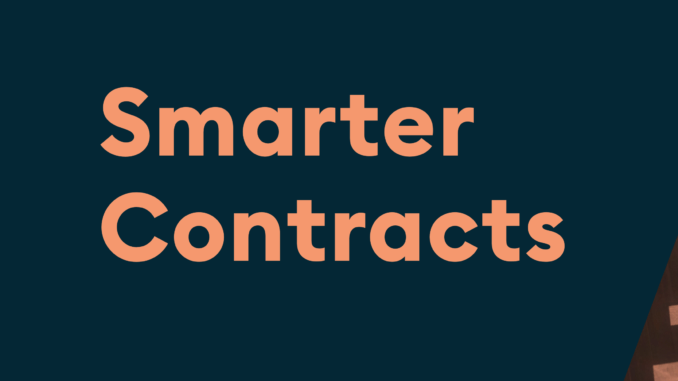
First we had just good old-fashioned ‘contracts’, then we had ‘smart contracts’, now we have ‘smarter contracts’.
LawtechUK and its UK Jurisdiction Taskforce (UKJT) now want to ‘encourage’ you to develop an ‘increased understanding and use of smarter contracts’, they have announced.
To do this they have released a set of case studies that show the technology being used to ‘improve different types of contracts across commercial, financial and consumer sectors’.
Sounds like solid legal tech fun, even if this also seems to be a repackaging of already well-developed ideas pioneered by the likes of Clause (now part of DocuSign) on one hand, and more mundane tech on the other, all under one handy term: smarter contracts.
Any road, what are they? This is how they explain things:
‘Smarter contracts are legally-binding digital contracts that use technology to provide benefits over conventional contracts. They span a wide spectrum, ranging from simple applications like electronic signatures, to human and machine-readable digital contracts, to sophisticated ‘self-executing’ smart legal contracts, which may be integrated with blockchain technology.’
The case studies demonstrate why ‘smarter, technology-enabled ways of contracting add value to business practices and show how widely the technology is already being used’, they stressed.
Examples include:
- ‘contract management tools enabling contracts to be read by both machines and humans so that the valuable data they contain can be instantly extracted and used
- the use of digital documents and blockchain technology in supply chains reducing friction in global trade and transforming logistics operations
- smarter parametric insurance contracts allowing for immediate payments to be made as soon as the relevant data is recorded – for example, when flights are delayed or storm damage occurs
- self-executing contracts being central to renewable energy microgrids, with the automatic recording of transactions and immediate payments for small amounts of energy significantly increasing efficiency and enabling the transition to clean energy
- smarter contracts and blockchain technology being used to expedite the sale, purchase and registration of homes
- smart legal contracts and non-fungible tokens being securely linked to the ownership of physical assets, revolutionising the way assets are traded with economic and environmental advantages.’
The project, is led by Emma Dearnaley, Head of Legal Services Innovation at the Ministry of Justice, on secondment to LawtechUK.
Dearnaley commented: ‘Contracts are a vital part of all economic relationships in all sectors. Yet many still approach contracts in much the same way as we have for centuries, creating and managing them in paper form. Technology makes this unnecessary now. Contracts and the valuable data they contain can be digitised, offering a wide range of benefits and the opportunity to reimagine contracts as live sources of intelligence that add value to business all the time.
‘At LawtechUK we wanted to build on the legal and technical work already done by shining a light on practical ‘smarter contract’ solutions to real-world problems, to spark ideas and inspire confidence in the further use of these new technologies. The Smarter Contracts report provides an accessible way for people to see and understand what is possible. Our thanks to everyone involved.’
You can find out more via the report here: Smarter Contracts report.
Is this a big deal? Overall, it looks like another effort to promote the main ideas behind complex smart contracts that this site and others have explored before. By blurring the terminology they get to include generally ‘machine readable’ contracts without always having to include the self-executing bit, or so it seems. (They also link this to e-signatures, which seems a bit of a stretching of the terminology.)
There is also a focus on blockchain, and that’s very much in turn linked to crypto, which some lawyers are excited about….because a lot of the big investors and banks are also excited about such assets. Where there is money, there are legal needs, as they say.
That said…….is your law firm or inhouse team making use of smart contracts, or even ‘smarter contracts’? Would be delighted to hear where you are now with this.